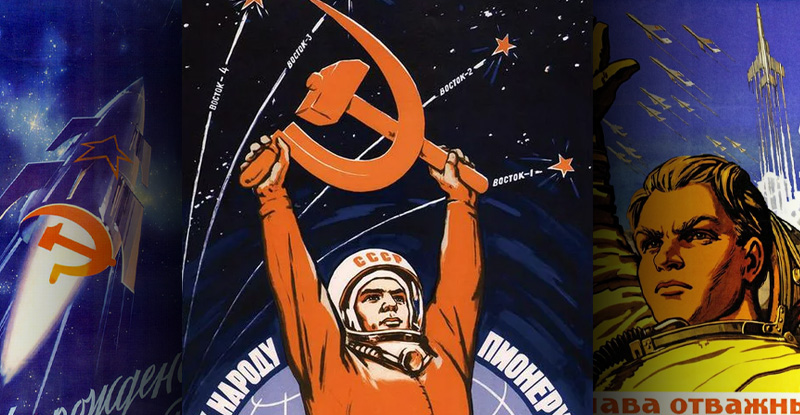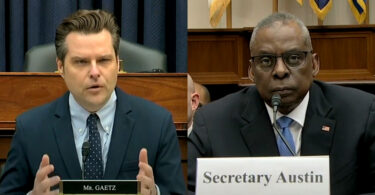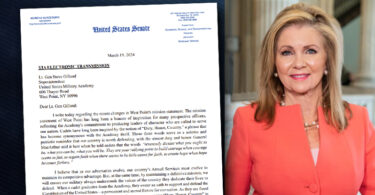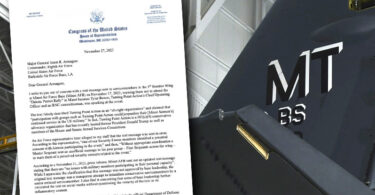In Lt Col Matthew Lohmeier’s recent testimony on Capitol Hill, he included in his statement his complaint (below) to the DOD IG.
It’s a shocking look at the off-the-charts level of anti-American, divisive Marxist ideology/propaganda being pushed on serving members of the US Space Force. Soviet Political Commissars would fall off their chairs knowing this activity was going on at an American base. PRC military political commissars would smile at the American “Struggle Sessions”.
How very far we’ve come from fighting Marxism during the Cold War to welcoming and indoctrinating our military forces with the very ideology we opposed for 70 years. How do Guardians want to fight and defend our country that they are taught to hate?

18 November 2020
MEMORANDUM FOR RECORD
FROM: 11 SWS/CC
SUBJECT: Fair and Equal Treatment of Individuals at Buckley Air Force Base Colorado
1. Colonel Devin Pepper, Garrison Commander at Buckley Air Force Base Colorado, has unethically used his position to promote anti-American propaganda to the military personnel at his base.
The ideologically-driven narrative he espouses, which is rooted in critical race theory (CRT), is engendering division and resentment within the ranks, undermining good order and discipline, and eroding the confidence military professionals place in their oath to support and defend the Constitution of the United States.
2. Under the banner of “Diversity & Inclusion,” this divisive agenda has continued at Buckley Garrison despite the Office of Management and Budget’s (OMB) Memorandums (dated 4 September 2020 and 28 September 2020; Attachment 1), the President’s Executive Order (EO) (dated 22 September 2020; Attachment 2, e.g. Sections 2 & 3), and the Defense Department’s Memorandum on implementation of the EO (dated 16 October 2020; Attachment 3) otherwise banning such trainings.
Some of the trainings at Buckley Garrison are racist and hostile, and undermine our obligation to ensure the fair and equal treatment of all individuals before the law.
The present memorandum summarizes only some of what I have witnessed since arriving at Buckley in June 2020, and is not an effort to be exhaustive.
Further, it details occurrences both preceding and succeeding the aforementioned EO and memorandums.
I point out that my experience is not unique, and that other leaders and military personnel have discussed with me their concerns over the climate at the base but that they are unsure how to address the problem.
3. On 24 June 2020, shortly after I moved to Buckley, the base commander sent an email containing anti-American, progressive political propaganda to the members of his base (Attachment 4).
He requested that members comprised of both Air and Space Force personnel view two propaganda videos prior to the upcoming “Buckley Connects Virtual Wingman Day.”
The two videos were “The Uncomfortable Truth (Amazon Prime, 2017), by Loki Mulholland, and “13th” (Netflix, 2016). They contain at least the following inappropriate and concerning elements:
a. “The Uncomfortable Truth” portrays American history as fraught with racism from 1619 till the present. It teaches that a racist social order was codified by the US Constitution to allow whites to remain in power and subjugate and oppress blacks, and that we have never escaped from that foundation of racism; that upon ratification of the constitution “white supremacy was now the official policy of the United States of America.”
b. “13th” portrays Republican politicians as racist (claiming, for example, that George Bush won his election by causing Americans to fear black people, and also showing clips of Donald Trump before the 2016 election that cast him in a negative light, insinuating that he has fueled systemic racism in America), portrays Democrats as aiding the black community (for example, favorable clips of Barack Obama, and Bill and Hillary Clinton), and interviews a famous Marxist activist (Melina Abdullah, Black Live’s Matter LA chapter organizer and activist) in order to build a suitably unfavorable narrative about American history in order to justify and demonstrate sympathy for violent riots specifically.
The United States is referred to as a “system of oppression” throughout the film. The President of the United States is cast in a terrible light (and out of context) at 1:20:15 to imply he enjoys oppressing blacks and keeping minorities in an inferior status.
As a commander of young military professionals, all of whom have taken the oath to support and defend the constitution, I am very concerned that group identity politics and anti-American propaganda is eroding the trust and confidence these young people have in their country and in the constitution.
This same ideology has, in various forums, continued to be promulgated throughout my time at the base.
4. On Friday, 26 June 2020, the base hosted the “Buckley Connects Virtual Wingman Day,” during which conversations on “Race, Respect, and Healing” took place.
The stated goal of the event was to “create safe spaces” to discuss race and seek “racial healing” (Attachment 5).
Statements were read at the beginning of small group discussions to generate conversation. It was suggested to facilitators of these group discussions to read the following statements:
“Police in America are more suspicious of certain people based on their race,” and “I believe racism is prevalent in our country (…in the Air Force).”
Participants were asked to write whether they agreed with the statements and share their responses with the group.
Once participants were “more comfortable,” they were directed to “get serious, and deepen the conversation” using at least three of the following:
“How often do you think about your racial or ethnic identity?”
“What aspect of your racial or ethnic identity makes you the proudest?”
“In what ways does being your specific race or ethnicity impact your personal and/or professional life?”
“Does racial or ethnic identity enter in your process of making important or daily decisions?”
“Have you ever felt ‘different’ in a group setting because of your race/ethnicity? How did this affect you? How often/deeply do you interact with people of a different racial/ethnic identity other than your own?”
“Have you ever witnessed someone being treated unfairly because of their racial or ethnic identity? In the Air Force? If so, how did you respond? How did it make you feel?”
“What do you think needs to happen before our country can achieve healing and forgiveness? What can we do locally? In the Air Force?”
It was hoped that these discussions would “provide opportunities to acknowledge the tremendous damage inflicted by individual and systemic racism,” and lead participants to become “oriented toward equity.”
These statements and questions imply that certain ideas are a foregone conclusion, thereby subtly coercing participants into acquiescence or simply shaming them into silence.
The climate created by these discussions leads participants to feel that if they disagree they are likely to be viewed as “racist,” or “part of the problem,” or as “getting political.”
5. Around the same time, other guidance (in the form of emails, town halls, Facebook Live events, discussion guidelines, and talking points) was disseminated to help leaders on the base facilitate ongoing conversation about racial injustice and inequity in the country and in the service.
Once such tool that was sent to leaders, titled “Difficult Conversations: Racial & Ethnic Diversity” (Attachment 6), discussed the importance in “establishing a safe and courageous environment within your workplace” in order to minimize discomfort in discussions about race.
Leaders were also cautioned, however, that “for some Airmen and Space Professionals-particularly members of marginalized, non-majority or targeted identity groups-you may not be able to provide complete safety.”
The implication, of course, was that the military workplace is not already a safe environment for minorities and that “identity groups” play a fundamental role in military organizational culture and identity.
6. Emails about race and racism from various base agencies, including from the base commander, continued to go to base personnel during the months of June and July 2020.
In one such email from Col Pepper, he asked leaders to read an article written by Daisy Auger-Dominguez (the Chief People Officer at VICE Media Group, and Vice-Chair of the board of directors of Planned Parenthood Federation) titled, “Getting Over Your Fear of Talking About Diversity,” which he attached to his email (Attachment 7).
The article suggests leaders read certain books to educate themselves about “issues of women, people of color, people with disabilities, LGBTQ+, religious minorities, and other marginalized groups.”
The books recommended included ljeoma Oluo’s So You Want to Talk About Race (see Paragraph 11 ), Minda Harts’ The Memo: What Women of Color Need to Know to Secure a Seat at the Table, Jodi Patterson’s The Bold World, and Dolly Chugh’s The Person You Mean to Be: How Good People Fight Bias.
The article further instructs leaders to “apologize and admit your mistakes,” and to take up the work “as an ally in a position of power” to launch “team conversations about white fragility, holding all-hands meetings calling out racially charged incidents when they happen, or introducing yourself with your pronouns.”
7. In July 2020, Col Pepper suggested that the base Community Support Coordinator compile a list of Diversity & Inclusion initiatives (i.e. book clubs, small group discussions, etc.) that had been implemented by the various units on base so that such initiatives might be “shared with everyone” (Attachment 8).
In a 10 July email solicitation of those initiatives, it was advertised that the Buckley Chapel team was developing its own discussion groups.
The first topic to be discussed was “valuing people.” The chapel explained that “we will do so by watching a video on racism that documents generational and political racism followed by a facilitated discussion on racism.”
I later came to learn from young enlisted space professionals in my own unit as well as from Chaplain Travis Barrino, that the chapel had also established minority small group discussions, and classes titled “Race in America” that were available to everyone.
Twelve days later, a follow-up email was sent by the Community Support Coordinator to base leaders containing a consolidated list of Diversity & Inclusion initiatives.
Among them, the base Force Support Squadron shared that they were giving their enlisted members “homework” to research issues related to race in America, and that they would be discussing their homework bi-weekly at enlisted calls to “keep the discussion on Race and Respect a constant topic in the squadron.”
These are merely a couple of examples of initiatives among others being organized at Buckley Garrison.
8. In July 2020, shortly after I took command. Chaplain Barrino and SSgt Jerome Cobb stopped by my office to introduce themselves. Then squadron superintendent, SMSgt Kevin Ryan, was in my office at the time of the brief introduction.
Chaplain Barrino explained that it was no longer the Chapel’s practice to give office space to their chaplains over in the chapel, that that was how the chapel used to do things, but that the chaplains were now expected to live amongst and be imbedded in the units they served.
He explained that Lt Col Ray Brushier had already provided him an office space within the cyber squadron, and that he (the chaplain) was also interested in finding office space within my unit, the 11th Space Warning Squadron (11 SWS) (the chaplain clarified during the conversation that he was not looking for his own office, per se).
He also explained his intent to share the “Race in America” classes or lectures with the members of my unit.
I explained to him that I was on my way out the door, kindly expressed hesitation at his proposal, and said that I would like to sit down with him at some point soon to meet him and learn more about the classes.
The chaplain seemed surprised at my hesitation and pursued the issue further.
Surprised by his insistence, I respectfully explained that this was an operations squadron, that we have a mission to accomplish, that there was no greater advocate of the important role of the chaplaincy than me, but that there was also a proper balance between operations and chaplain support that I was interested in finding.
At that, he said, “I have heard about commanders like you, but I’ve never met one.”
While I cannot know for sure what was meant by the chaplain’s statement, I considered it a jab.
The comment seemed intended to convey the chaplain’s dismay at my reluctance to readily welcome his classes (about which I knew very little at the time) into my squadron.
The chaplain has a friendly demeanor, and though his statement was not said with an angry tone, I could not help but perceive he viewed me as an opponent to what he was pursuing, and it left me concerned about our interaction.
I do not know if our initial conversation was shared with others. SMSgt Ryan was present for the entirety of our brief visit.
9. On Wednesday, 12 August 2020, at 1400, Chaplain Barrino sat down with me and my superintendent, SMSgt Ryan, in my office to discuss the contents of the “Race in America” classes.
The conversation lasted for about an hour and fifteen minutes. The chaplain explained that the classes were intended to facilitate dialogue on how we can heal as a nation and as a service, and overcome systemic racism.
I asked him what he meant by systemic racism. He replied with an unclear vignette, skirting the issue somewhat, and then replied, after brief hesitation, “basically, whites are racist.”
I told him I did not believe such a problem existed in our country or within our service, and explained to him why I thought such a message not only had no healing power, but that I was concerned it would create division and unhealthy tension between members of my unit.
We had much dialogue over these issues, which for the most part was professional and respectful despite our opposite views.
The chaplain shared many views which gave me cause for concern.
Among the most alarming to me were his views that the United States was founded by racists, that American history was written by a white oppressor class that was racist, and that “history must be re-written.”
I again expressed concern over his views. I explained to him that to impugn guilt to members of my unit solely based on the color of their skin was the very definition of racism.
I also expressed my concern that the narrative he had chosen to adopt about American history was fueled by a divisive political ideology that was dangerous. He of course disagreed.
I also explained to him that his narrative on race and American history undermined the trust our service members place in their oath to support and defend the constitution. He disagreed.
10. In September 2020, an active duty, black female enlisted member of my unit came to my office to discuss a concern she had with regards to another male member of the unit. My First Sergeant, MSgt Ryan Kane, was present for the conversation.
We had a long conversation with the member, and took very seriously and investigated her concerns about a statement she overheard another member of the unit make to his friends, to which she took offense and considered racist.
That particular complaint was adjudicated appropriately and to the satisfaction of myself, my First Sergeant, and the complainant, and is not the issue I would like to address.
During the course of conversation with this female member, she explained “I never knew before that I was an outsider; not just in my country, but in my own service. I never knew about that until I attended the classes at the Chapel with the chaplain.”
We asked her about the classes, and she explained that she had been attending a minority group discussion hosted by the chaplain at which they were discussing issues of race in America.
It was clear to the First Sergeant and me that this member was being trained to view the motives, statements, and behaviors of others as racist.
The fact that the member said she “never knew before” that she was an outsider, gave us greater cause for concern over the classes that were being hosted by the chaplain.
The First Sergeant and I are aware of at least one other member of our unit (also a black enlisted member) attending the classes.
The classes in question, which plant this divisive, fear-filled and hate-fueled ideology into the hearts of our active duty members, is not only known about by the Garrison Commander (the “base commander” became the “garrison commander” on 24 July 2020), but has his ongoing support and advocacy, as is evidenced in his emails to the base, his base resiliency days, his town halls in which he makes occasional mention of these initiatives, and his Team Buckley bi-weekly tag-up during which he and the Chaplain invite others to attend these discussions.
11. The Garrison Commander and the base chapel are sponsoring a “Discussions on Race Book Club” at which critical race theory (CRT) is taught.
The first such discussion took place on Thursday, 29 October 2020, which I attended via live-stream.
It is noted that these discussions are being facilitated long after the Executive Order was issued (reference Paragraph 2 and Attachment 2, e.g. Sections 2&3) directing government officials to cease “training” government workers to believe divisive, anti-American propaganda, specifically critical race theory.
The book discussed at the first event was So You Want to Talk About Race, by Ijeoma Oluo (see Paragraph 6), and the discussion was facilitated by an active duty, black female officer member of the 2d Space Warning Squadron.
The book teaches that the United States is “a white supremacist society” that must be “dismantled piece by piece.”
It teaches that speech that makes “people of color feel unsafe” is “an act of violence,” but that if whites are uncomfortable, “do not allow [them] to be treated as if harm has been done to them.”
The book suggests ways a reader might want to consider facilitating discussions about the contents of the book, saying
“the comfort of white attendees should be very, very far down on the priority list.”
In its suggestions regarding creating safe spaces, the book advocates reintroducing a form of segregation into American society:
If whites “feel strongly that they need to center their feelings and experiences in the discussion, set up a space away from the group where they can talk with other white people. Do not let it take over the group discussion or become a burden that people of color in the group have to bear.”
Further, it emphatically touches upon the many other aspects comprising critical race theory, topics such as: privilege, intersectionality, police brutality, cultural appropriation, and microaggressions.
The book proposes organizations to which concerned readers should be donating their money, such as the ACLU, Planned Parenthood, and the NAACP.
It instructs readers that they should vote for politicians who support raising the minimum wage, and who favor police reform.
One participant in the group, who mentioned he was currently also reading Robin DiAngelo’s White Fragility, expressed how glad he was that “Colonel Pepper was able to use his bully pulpit” to push these discussions on race.
12. Since arriving at Buckley, I have heard rumors from at least several unrelated sources that Colonel Pepper is hosting minority only, small group mentorship gatherings at his on-base residence.
I have not sought to verify the truthfulness of those rumors, but mention it here because it is related to the other items discussed in the present memorandum, and because the rumors alone have fueled a perception of unfairness for some active duty members at the base.
13. As the President’s Executive Order states,
“These types of trainings not only run counter to the fundamental beliefs for which our Nation has stood since its inception, but they also engender division and resentment within the Federal workforce.”
They do not engender inclusion, but prevent it.
As a commander, I am seeing this play out in real-time in the military at a break-neck pace.
Military members who take an oath to support and defend the constitution are being “trained” to hate America’s founding, history, and current standing of privilege in the world.
Books such as Oluo’s, and other videos and training materials that have been disseminated and discussed on the base, which are rooted in CRT, should have no place in the United States military, yet these trainings and materials were sponsored by the Garrison Commander and the chaplaincy.
The ideology I have described dismisses individuality outright and demonizes entire groups of people (e.g. whites).
Further, it pits groups and classes of people against one another creating a polarized political and social environment, cancels fraternal ties, imagined or real, and undermines our obligation to ensure the fair and equal treatment of all individuals before the law.
MATTHEW L. LOHMEIER, Lt Col, USSF
Commander
8 Attachments:
1. OMB Memorandum M-20-34, “Training in the Federal Government,” 4 September 2020; OMB Memorandum M-20-37, “Ending Employee Trainings that Use Divisive Propaganda to Undermine the Principle of Fair and Equal Treatment for All,” 28 September 2020
2. Executive Order on Combating Race and Sex Stereotyping, 22 September 2020
3. Secretary of Defense Memorandum, “Implementation of Executive Order on Combating Race and Sex Stereotyping,” 16 October 2020
4. Email dated 24 June 2020
5. Attachment to email dated 19 June 2020
6. Handout titled “Difficult Conversations: Racial & Ethnic Diversity”
7. Attachment to email dated 22 July 2020
8. Emails dated 10 July 2020 and 22 July 2020
(STARRS NOTE: The DOD memo regarding implementing EO 14950 has been wiped from the internet. If you find it, let us know)
From a CIA report regarding increases in the number of political officers in the Soviet Armed Forces:
“These political officers are the direct superiors of the entire personnel of the company (Battery) and the eyes of the Communist Party. . . . . Political instruction in the armed forces is the main guarantee of the power of the USSR, that every future war will be turned into a class war and that, therefore, the Soviet army must be specially well trained politically.”
And another report said,
“The political officers who are directly responsible for the training of all troops…aimed at the following objectives:
-
- Generation of hatred for Anglo-American imperialists
- Preparing the soldier psychologically for war by eliminating from his mind all remaining positive feelings toward the former allies, USA and England
- Educating the soldiers to vigilance, constant battle preparedness and willingness to help the commanding officers in maintaining control over the unit
- Denunciation and elimination of all dissatisfaction among soldiers”
These “commissars,” as they were first called, exercised specific official and unofficial control functions over their military command counterparts. The political officers also served to further Party interests with the masses of drafted soldiery of the USSR by indoctrination in Marxist-Leninism. . . . . .
. . . .This political control system was not benign; the indoctrination, kritika/samokritika, and artificial tension used as part of the Party activities caused friction at best, and outright paranoia at worst, among the military professionals. Indoctrination dulled the critical thinking processes. Repetition of the Party jargon, and in the absence of other information, the Marxist-Leninist formulas became the only framework for evaluating reality.
Kritika and samokritika, criticism and self-criticism respectively, were a core function of the mandatory Party meetings. At these meetings, the political staff was required to not only note who spoke, but exactly what was said. Party members of the enlisted ranks or junior officers were encouraged to freely criticize the military decisions or personal habits of the higher officers if these actions did not fit Party doctrine or norms. The effects of this practice on the commander’s authority must have been devastating. . . .
More on Soviet Political Officers/Political Commissars
White House Executive Order Installs Political Commissars Throughout Government








Leave a Comment